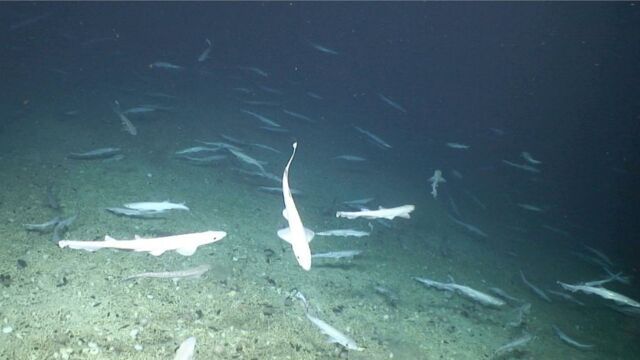Sometimes the fascinating discoveries made in the world aren’t too far from us, as was proved by leading researchers at INFOMAR, an Irish documentation program for the depths of the oceans. The aim of this project is to map out the physical, biological and chemical components on the ocean floor in coastal areas, all financed by the Irish government but also by the European Union.
Discover our latest podcast
Whilst exploring the depths off the coast of Ireland, scientists made a discovery that they probably weren’t expecting to find. During a three-week long mission named SeaRover, they discovered an immense shark nursery. It was found in one of the six protected marine areas that exists in Ireland’s huge ocean territory.
Thousands of sharks and unhatched eggs
The area was discovered by a robot controlled from afar and whilst filming at 750 meters deep, it came across hundreds of sharks. To be more exact, Blackmouth Catsharks (Galeus melastomus), a species that measures less than a meter long and live in North Atlantic waters.
These sharks live peacefully close to coral reefs with other species such as hundreds of Sailfin Roughsharks (Oxynotus paradoxus), a bigger solitary shark that resides off our coasts. Although the presence of so many of these sharks surprised researchers, it’s the coral that surprised them the most.
Many unhatched eggs were also found here, scattered amongst the degraded corals. After being laid here by adult sharks during the summer, there were thousands of them, some in small pockets which were normal for some species of sharks. Although this discovery wasn’t unusual, it’s the first time that eggs like these have been spotted in such great numbers in Irish waters.
‘A major biological find’
‘It was incredible, real David Attenborough stuff. This is a major biological find and a story of this magnitude would have been on Blue Planet if they’d known about it. Very, very little is known on a global scale about deep-sea shark nurseries,’ explains David O’Sullivan, the chief scientist on the SeaRover survey to the Guardian. But scientists believe this isn’t the only surprise hidden here.
Although they were able to observe both eggs and adults, there has however been no traces of young sharks, leading researchers to believe that they are hiding elsewhere.
‘No pups were obvious at the site and it is believed that the adult sharks might be utilizing degraded coral reef and exposed carbonate rock on which to lay their eggs,’ continued David O’Sullivan.
‘A healthy coral reef in the vicinity, may act as a refuge for the juvenile shark pups once they hatch.’
To get to the bottom of this researchers are planning to send the robot back down there in the next few weeks to see the evolution of this nursery. These discoveries are important for finding out more about the biodiversity of the life cycle of sharks living in these Irish depths and also, so researchers can develop their marine conservation program.
Conservation areas where wildlife develops
This nursery is located in a conservation area, where trawl fishing is forbidden. As a consequence, these areas are generally swarming with marine life that is still poorly documented. Moreover, sharks aren’t the only animals that were found in this degraded coral reef in Ireland. From the footage shot during this expedition, specialists were also able to observe sea urchins, crabs and even octopi.
These many sightings prove just how important these areas are for our ecosystem. And sharks aren’t the only animals to create nurseries such as this. Scientists have also recently discovered something similar off the coasts of California, but instead of sharks, they found thousands of octopi.
Check the footage above to see the awe-inspiring footage!















